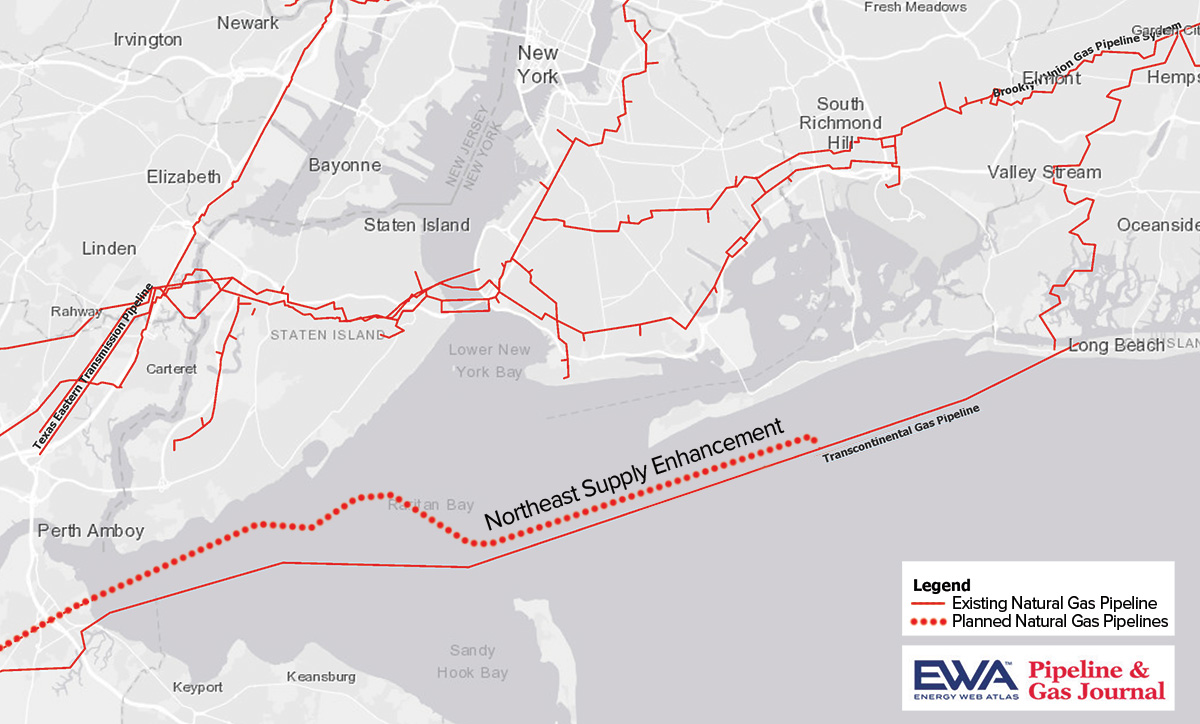Permit Denied for 24-Mile Underwater Pipeline by New York Regulators
ALBANY, N.Y. (AP) — State environmental regulators denied a water quality permit for a 24-mile (39-kilometer) underwater pipeline from New Jersey to Queens that backers say is crucial for meeting rising demand for natural gas in New York City and Long Island.

The Northeast Supply Enhancement project would expand the Transco pipeline, which extends from Texas to the Northeast coast. It would allow National Grid to bring natural gas from Pennsylvania’s shale gas fields to the metropolitan region.
The pipeline is opposed by environmental groups who say it threatens marine life and extends reliance on fossil fuels rather than renewable energy sources.
In denying the permit, the New York State Department of Environmental Conservation said the project “fails to meet New York State’s rigorous water quality standards” and “would cause impacts to habitats due to the disturbance of shellfish beds and other benthic resources.”
Chris Stockton, a spokesman for the pipeline developer, Tulsa, Oklahoma-based Williams Partners, said the DEC “raised a minor technical issue” with its application for water quality certification.
”Our team will be evaluating the issue and resubmitting the application quickly,” Stockton said. “We are confident that we can be responsive to this technical concern, meet our customer’s in-service date and avoid a moratorium that would have a devastating impact on the regional economy and environment.”
New Jersey regulators must also decide on the project by June 5.
The pipeline was approved by the Federal Energy Regulatory Commission on May 3. National Grid says the project is crucial because existing pipeline infrastructure is at capacity and natural gas demand is projected to rise 10% in the next decade in the New York City region.
Opponents claim the need for a pipeline can be avoided through energy efficiency measures and installation of heat pumps in homes and small apartment buildings.
Democratic Gov. Andrew Cuomo banned fracking for natural gas in the state in 2014. Since then, anti-fracking activists have targeted pipelines and other natural gas infrastructure, saying it makes no sense to support increased use of fossil fuels when the state is committed to switching to renewable energy.
In his 2019 executive budget, Cuomo mandated that 70% of the state’s electricity come from renewable energy by 2030 and a 100% reduction in greenhouse gas emissions from 1990 levels by 2040.
New York regulators denied a permit for another Williams project extending eastward from Pennsylvania’s gas fields, the Constitution Pipeline, in 2016, citing threats to wetlands. A lawsuit filed by the company is pending.
Business and labor groups have lobbied in favor of the pipeline, saying investment in job creation requires certainty about a sufficient energy supply.
National Grid has threatened to impose a moratorium on new gas hookups in New York City and Long Island if the pipeline isn’t built. Consolidated Edison has already imposed such a moratorium in suburban Westchester County, saying existing pipelines can’t satisfy increased demand for natural gas.
Related News
Related News

- Keystone Oil Pipeline Resumes Operations After Temporary Shutdown
- Biden Administration Buys Oil for Emergency Reserve Above Target Price
- Freeport LNG Plant Runs Near Zero Consumption for Fifth Day
- Enbridge to Invest $500 Million in Pipeline Assets, Including Expansion of 850-Mile Gray Oak Pipeline
- Williams Delays Louisiana Pipeline Project Amid Dispute with Competitor Energy Transfer
- Evacuation Technologies to Reduce Methane Releases During Pigging
- Editor’s Notebook: Nord Stream’s $20 Billion Question
- Enbridge Receives Approval to Begin Service on Louisiana Venice Gas Pipeline Project
- Mexico Seizes Air Liquide's Hydrogen Plant at Pemex Refinery
- Russian LNG Unfazed By U.S. Sanctions




Comments